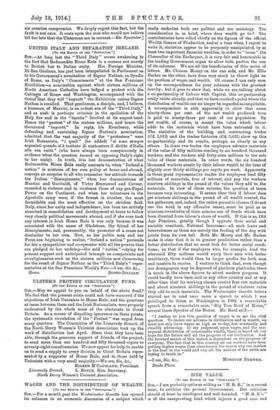WAGES AND THE DISTRIBUTION OF WEALTH.
[To THE EDITOR or THE BrECTAVZ.*] SIR,—For a month past the. Westminster Gazette has opened its columns to an economic discussion of a subject which
really underlies both our politics and our sociology. The consideration is, in brief, where does wealth go to P The contributories have relied chiefly on the figures of the official Wealth Census of Production, and at a time when, I regret to write it, statistics appear to be purposely manipulated, by at least two important financial weeklies, in order to " boom " the Chancellor of the Exchequer, it is very fair and honourable in the leading Government organ to allow both parties the run of its columns. We are all the beneficiaries of this series of letters. Mr. Chiozza Money on the one side, and Mr. Ellis Barker on the other, have done very much to throw light on the problem of wages and wealth. Of course I can only sum up the correspondence for your columns with the greatest brevity; but it goes to allow that, while we are talking about a co-partnership of Labour with Capital, this co-partnership really exists already, and that we have reached a point where the distribution of wealth can no longer be regarded as inequitable. A correspondent is able apparently to show that some ninety-three per cent. of the net wealth produced here is paid to ninety-three per cent. of our population. By net wealth, of course, is meant the value which labour adds to the materials which have been entrusted to it. The statistics of the building and contracting trades (Cd. 5,813) and the timber factories (Cd. 5,621) show up this co-partnership and its results, perhaps, as clearly as any others. In these two trades the employers advance materials of the value of fifty millions sterling to six hundred thousand workers, and the workers add forty-nine millions to the sale
value of these materials. In other words, the six hundred thousand workers create by their labour wealth to the tune of slightly over thirty shillings per capita per week. Apparently in these great representative trades the employers lend fifty
millions of materials, free of interest, and pay the workers nineteen shillings in the pound of the values they add to the materials. In view of these returns, the question of taxes becomes very interesting. It seems clear that if labour does get nineteen shillings in the pound of all wealth created, the tax gatherers, and, indeed, the entire parasitic classes (I do not use the word in any offensive sense), must be paid as to nineteen-twentieths of their salaries out of funds which have
been diverted from labour's share of wealth. If this is so, Old Age Pensions, greatly though I approve their social and sociable resultant, National Insurance—all such loans and benevolences as these are merely the feeding of the dog with joints from its own tail. Both Mr. Money and Mr. Barker make it clear that it is to greater production rather than a better distribution that we must look for better social condi- tions; so that if the employers who, for example, lend the aforesaid fifty millions would equip their men with better machinery, there would then be larger profits for both men and masters to receive. I venture to think that, even though our demagogues may be deprived of platform platitudes, there
is much in the above figures to attest modern progress. It could hardly have been said in any other country and at any
other time that its working classes receive free raw materials and about nineteen shillings in the pound of whatever value they add to such materials. The Westminster Gazette letters
started me to read once more a speech to which I was privileged to listen at Washington in 1894, a remarkable speech from a remarkable man, "Big Tom Reed of Maine," several times Speaker of the House. Mr. Reed said :— "I confess to you this question of wages is to me the vital question. To insure our advance in civilization and in wealth, we must not only have wages as high as to-day, but constantly and steadily advancing. In my judgment, upon wages, and the con- sequent distribution of consumable wealth, there is based all our hope for the future and all the progress of our civilization. And the forward march of this nation is dependent on the progress of everyone. The fact that in this country all our workers have been getting higher wages than elsewhere is the reason why our market is the best in the world and why all the nations of the earth are trying to break in."
Brede Place.










































 Previous page
Previous page